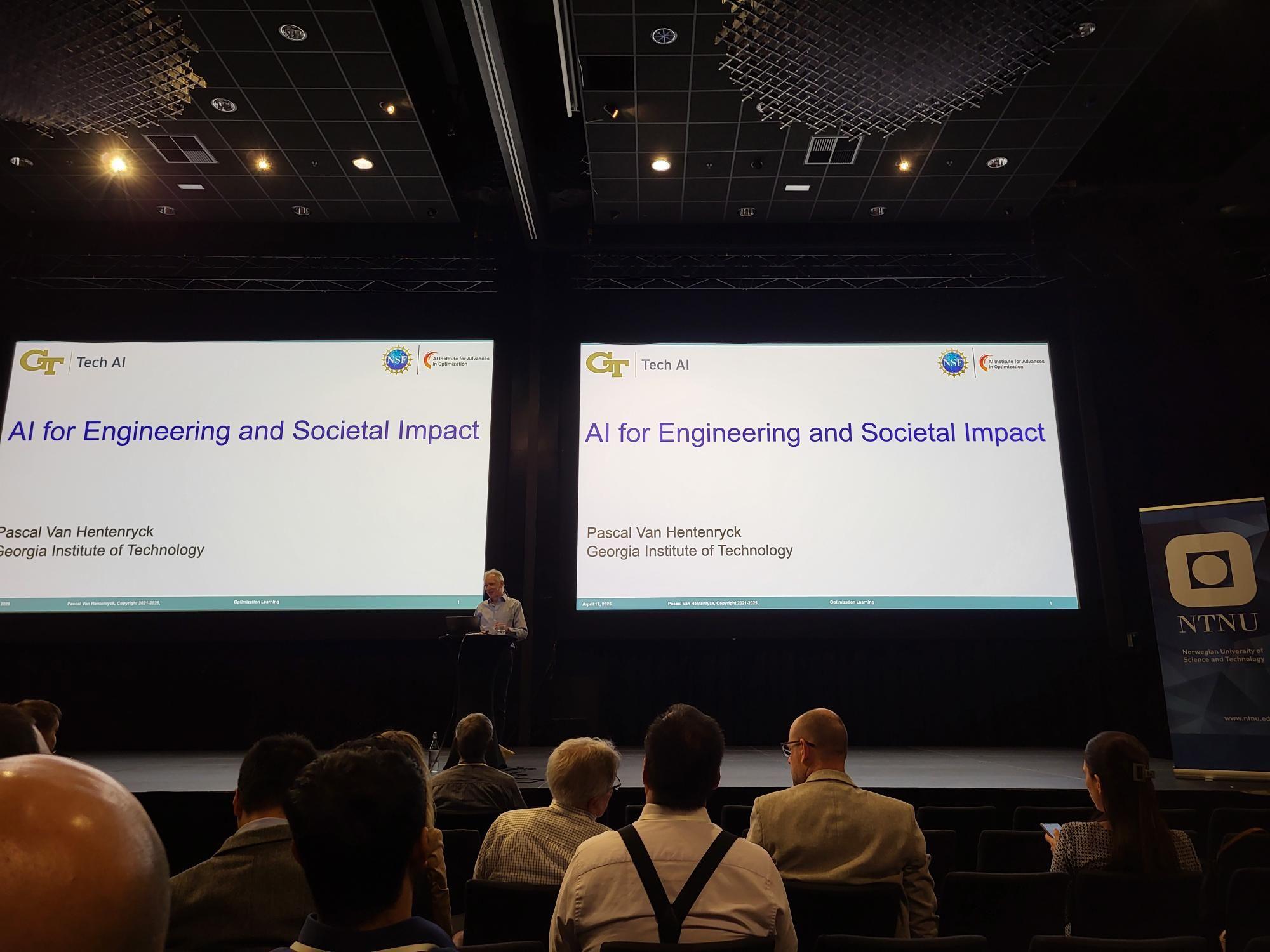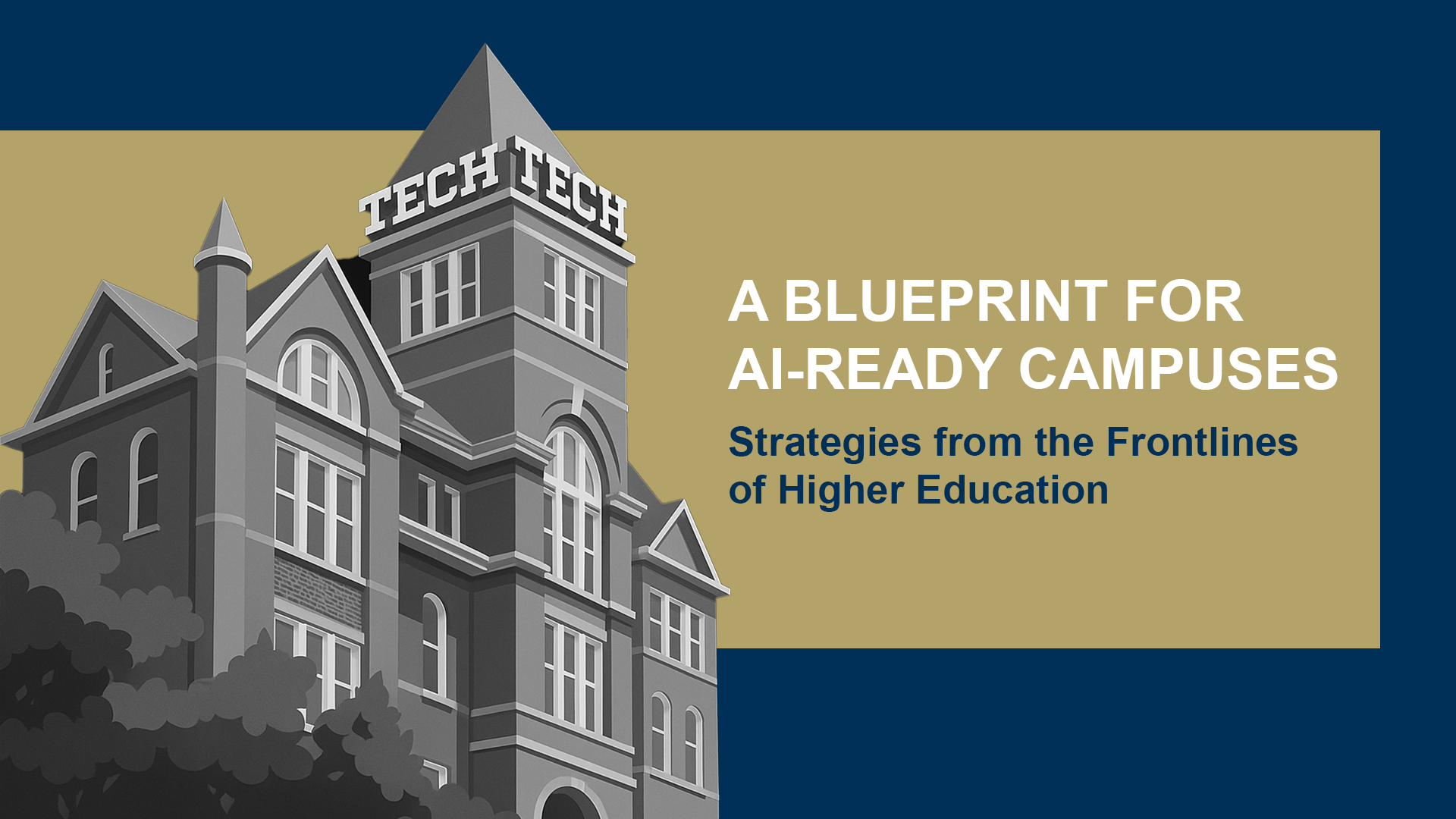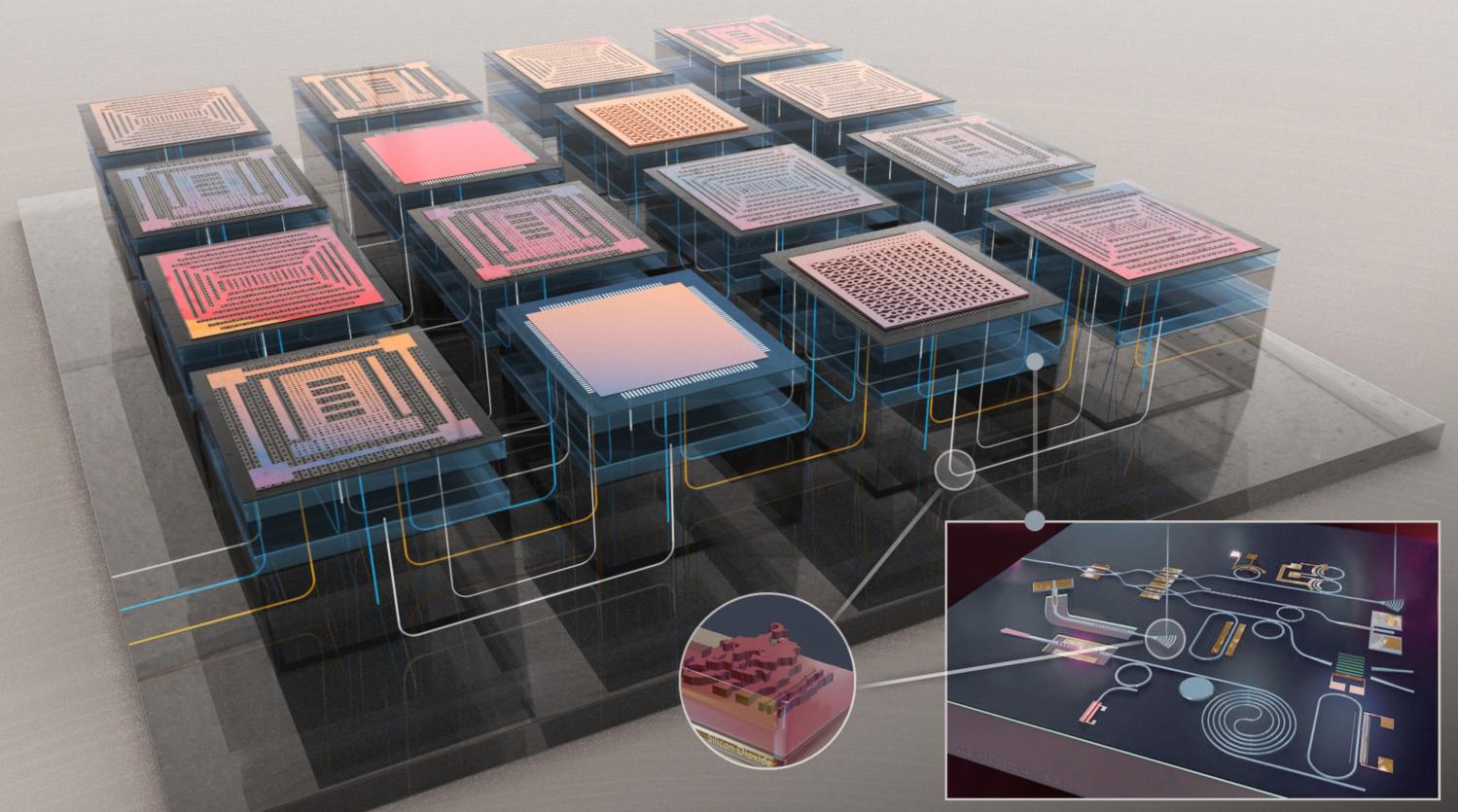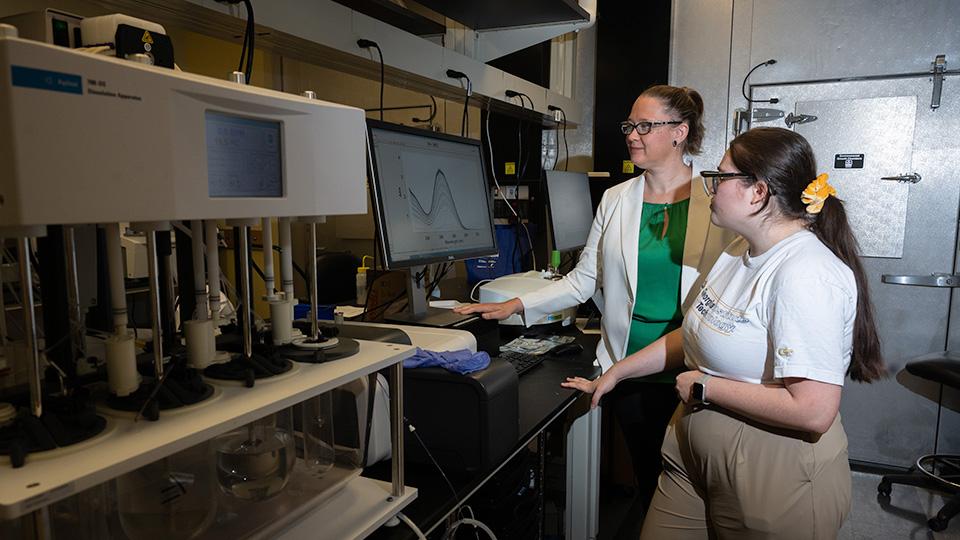Georgia Tech AI Leader Delivers Keynote on AI for Engineering & Societal Impact at IFAC MIM 2025
Jul 10, 2025 —

Pascal Van Hentenryck, the A. Russell Chandler III Chair and professor at Georgia Tech, and director of the U.S. National Science Foundation AI Institute for Advances in Optimization (AI4OPT) and Tech AI, delivered a keynote address at the 11th IFAC Conference on Manufacturing Modelling, Management and Control (MIM 2025), hosted by the Norwegian University of Science and Technology (NTNU).
Combining Technologies for Real-World Results
Van Hentenryck introduced a series of foundational approaches—such as primal and dual optimization proxies, predict-then-optimize strategies, self-supervised learning, and deep multi-stage policies—that enable AI systems to operate effectively and responsibly in high-stakes, real-time environments. These frameworks demonstrate the power of integrating AI with domain-specific reasoning to achieve results unattainable by either field alone.
“This is not just about building smarter algorithms,” Van Hentenryck said. “It’s about designing AI that can adapt, learn, and optimize under uncertainty—across supply chains, energy systems, and manufacturing networks.”
Grounded in Real-World Impact
The keynote aligned directly with the MIM 2025 focus on logistics and production systems. Drawing from recent work in supply chain optimization and smart manufacturing, Van Hentenryck emphasized how AI4OPT’s research is already generating measurable impact in industry.
MIM 2025, organized by NTNU’s Production Management Research Group and supported by MHI and CICMHE, featured more than 40 experts delivering keynotes, presenting research, and leading breakout sessions across topics in modeling, control, and decision-making in manufacturing and logistics.
About Tech AI
Tech AI is Georgia Tech’s strategic initiative to lead in the development and application of artificial intelligence across disciplines and industries. Serving as a unifying platform for AI research, education, and collaboration, Tech AI connects researchers, industry, and government partners to drive responsible innovation in areas such as healthcare, mobility, energy, sustainability, and education. Director of Tech AI, Pascal Van Hentenryck helps guide the institute’s research vision and strategic alignment across Georgia Tech’s AI portfolio. Learn more at ai.gatech.edu.
About AI4OPT
The AI Institute for Advances in Optimization (AI4OPT) is one of the National Science Foundation’s flagship AI Institutes and is led by Georgia Tech. The institute brings together experts in artificial intelligence, optimization, and control to tackle grand challenges in supply chains, transportation, and energy systems.
AI4OPT is one of several NSF-funded AI institutes housed within Tech AI’s collaborative framework, enabling cross-disciplinary research with real-world outcomes. Learn more at ai4opt.org.
Breon Martin
AI Marketing Communications Manager
Georgia Tech Supports Panama’s National AI Strategy Development
Jul 10, 2025 —

In a bold step to advance AI across Latin America, Georgia Tech is helping Panama develop its first National Artificial Intelligence Strategy—leveraging world-class research, global collaboration, and human-centered design.
In partnership with Panama’s National Secretariat of Science, Technology and Innovation (Secretaría Nacional de Ciencia, Tecnología e Innovación, or SENACYT) and Georgia Tech Panama, Tech AI the AI Hub at Georgia Tech co-led a series of multisectoral workshops in Panama City on July 7–8. The initiative convened voices from government, academia, civil society, and the private sector to co-create an ethical, inclusive and forward-looking roadmap for AI in Panama.
We’re moving forward with one of the most exciting and important processes for Panama’s future: the development of our National Artificial Intelligence Strategy,” said Franklin A. Morales, Head of International Technical Cooperation Panama's Secretariat for Science, Technology and Innovation at SENACY, in a public statement. “Georgia Tech’s expertise is helping us shape a strategy that’s both ambitious and grounded in global best practices.
The workshops were facilitated by Pascal Van Hentenryck, Director of Tech AI, the AI Hub at Georgia Tech and the NSF-funded AI Institute for Advances in Optimization (AI4OPT), and Tim Brown, Academic Program Director for AI at Georgia Tech Professional Education. Through interactive working groups, participants assessed Panama’s AI landscape, identified key challenges and opportunities, and helped lay the foundation for long-term national impact.
In a public statement, Van Hentenryck noted:
We had the honor to spend three days in Panama working on their National AI Strategy with SENACYT, Georgia Tech Panama, and so many stakeholders who contributed their expertise, talent, and time. More to come, obviously. And thank you to the teams at SENACYT, Georgia Tech Panama, and Tech AI at Georgia Tech for an amazing organization.
SENACYT’s vision for Panama’s AI future emphasizes the role of technology in advancing opportunity and improving lives. “The future is not something we wait for—it’s something we build together,” Morales added in a separate public statement.
Additional contributions from leaders across Panama’s innovation ecosystem emphasized the importance of developing homegrown talent, applying AI in high-impact sectors like health and education, and serving as a regional testbed for responsible AI solutions.
“This goes beyond technology. It’s about how we use artificial intelligence to improve people’s lives, make our systems more efficient, and elevate Panamanian talent,” shared a representative from Escala Latam. “We have a big opportunity: to train local talent, to scale responsible solutions, and to build, from Panama, solutions with global impact.”
The initiative reflects Georgia Tech’s broader commitment to advancing AI as a public good.
Through Tech AI and partnerships like this one, the Institute helps governments, industries, and communities around the world design AI strategies that are technically sound, globally relevant, and locally empowering.
“Artificial intelligence has been identified by SENACYT as a critical and emerging technology that requires urgent action to maximize its impact on the country’s economy, innovation capacity, and competitiveness,” said Eduardo Ortega Barría, National Secretary of Science, Technology and Innovation. “That’s why the National AI Strategy we are developing prioritizes broad and participatory reflection—this is a crucial step toward building a shared vision.”
As nations worldwide navigate the rise of artificial intelligence, Georgia Tech stands at the forefront, helping build AI strategies that are not only technically advanced but fundamentally human-centered.
GET INVOVLED
The public is also invited to shape the strategy. SENACYT launched a National Artificial Intelligence Survey—available through July 31 via www.SENACYT.gob.pa; SURVEY and SENACYT’s social media—to collect ideas, questions, and concerns from residents across Panama. (The survey includes 16 questions and is open to all residents of Panama—both nationals and foreigners. Its purpose is to gather perceptions, concerns, and opportunities to be considered in the national strategy. The survey will remain open until July 31, 2025).
About Tech AI
Tech AI is Georgia Tech’s interdisciplinary AI research and policy hub, bringing together expertise in optimization, robotics, ethics, education, and public-sector applications. With a mission to advance AI for social good, Tech AI helps partners across the globe design and deploy trustworthy, scalable AI systems.
About SENACYT
The National Secretariat of Science, Technology and Innovation (SENACYT) is an autonomous institution whose mission is to make science and technology tools for the sustainable development of Panama. Our projects and programs focus on advancing the country’s scientific and technological capabilities to close inequality gaps and promote equitable development that improves quality of life for all Panamanians.
Breon Martin
AI Marketing Communications Manager
Georgia Tech AI Tool Cuts Supply Chain Planning from Hours to Minutes
Jul 10, 2025 —

Researchers at Georgia Tech have developed a new artificial intelligence tool that dramatically improves how companies plan their supply chains, cutting down the time and cost it takes to generate complex production and inventory schedules.
The tool, known as PROPEL, combines machine learning with optimization techniques to help manufacturers make better decisions in less time. It was created by researchers at the NSF AI Institute for Advances in Optimization, or AI4OPT, based at Georgia Tech under Tech AI (the AI Hub at Georgia Tech).
The technology is already being tested on real-world supply chain data provided by Kinaxis, a Canada-based company that supplies planning software to global manufacturers in industries ranging from automotive to consumer goods.
Vahid Eghbal Akhlaghi, senior research scientist at Kinaxis and former postdoctoral fellow at AI4OPT and the H. Milton Stewart School of Industrial and Systems Engineering (ISyE) at Georgia Tech, said, “Our industry partner has been instrumental in shaping PROPEL’s capabilities. By validating the approach with real operational data, we ensured it addresses true bottlenecks in supply chain planning.”
"PROPEL represents a leap forward in how we tackle massive, complex planning problems," said Pascal Van Hentenryck, lead researcher, the director of Tech AI and the NSF AI4OPT Institute, and the A. Russell Chandler III Chair and Professor at Georgia Tech with appointments in the colleges of engineering and computing. "By combining supervised and reinforcement learning, we can make near-optimal industrial-scale decisions, an order of magnitude faster."
Traditional supply chain planning problems are typically solved using mathematical models that require immense computing power—often too much to meet real-time business needs. PROPEL, short for Predict-Relax-Optimize using LEarning, reduces this burden by teaching the AI model to first eliminate irrelevant decisions and then fine-tune the solution to meet quality standards.
Reza Zandehshahvar, one of the paper’s co-authors and postdoctoral fellow with the NSF AI4OPT and the H. Milton Stewart School of Industrial and Systems Engineering (ISyE) at Georgia Tech, said the breakthrough lies not just in the AI algorithms but in how they're trained and deployed at scale.
“Many AI models struggle when applied to problems with millions of variables. PROPEL was built from the ground up to handle industrial complexity, not just academic examples,” Zandehshahvar said. “We’re seeing real improvements in both solution speed and quality.”
In trials using Kinaxis’ historical industrial data, PROPEL achieved an 88% reduction in the time needed to find a high-quality plan and improved solution accuracy by more than 60% compared to conventional methods.
While many AI methods in supply chain rely on simulated data or simplified models, PROPEL’s performance has been validated using real-world scenarios, ensuring its reliability in high-stakes operational settings.
The Georgia Tech team says PROPEL could benefit industries that manage large, multi-tiered production networks, including pharmaceuticals, electronics, and heavy manufacturing. The researchers are now exploring partnerships with additional companies to deploy PROPEL in live environments.
Access the abstract on arXiv.
Breon Martin
AI Marketing Communications Manager
Georgia Tech Featured in National Report on AI-Ready Campuses
Jul 10, 2025 —

Georgia Tech has been recognized in a new IDC white paper, A Blueprint for AI‑Ready Campuses: Strategies from the Frontlines of Higher Education, as a national leader in deploying artificial intelligence across higher education. The report, published in partnership with Microsoft, highlights Georgia Tech’s comprehensive approach to integrating AI into teaching, research, and campus operations.
The Institute is one of only four U.S. universities featured in the report, joining Auburn University, Babson College, and the University of North Carolina at Chapel Hill.
“AI isn’t a single system or application—it’s a new foundation for how we work, teach, and learn,” said Leo Howell, Georgia Tech’s chief information security officer. “Our goal is to expose people to as many tools as possible, creating an ‘AI for All’ strategy that ensures everyone at Georgia Tech can leverage AI to enhance their work and learning experiences.”
Georgia Tech’s approach centers on a “persona-based model,” tailoring AI tools and resources to meet the needs of students, faculty, researchers, and administrators. That personalized approach, according to the report, is what makes Georgia Tech’s efforts both scalable and sustainable.
The white paper also emphasizes the importance of industry partnerships in Georgia Tech’s strategy. Through collaborations with Microsoft, OpenAI, and NVIDIA, the Institute is deploying advanced AI technologies while preparing students for the demands of an AI-driven workforce.
Georgia Tech’s success lies in its flexibility, the report notes. The Institute tests AI tools through targeted pilots, gathers user feedback, and rapidly iterates to improve outcomes. This adaptive mindset is recommended as a best practice for other institutions navigating their own AI transformation.
The full IDC white paper is available for download here.
Breon Martin
AI Marketing Communications Manager
Lighting the Way to Faster Data Transfer
Jul 09, 2025 —
Silicon-on-insulator (SOI) wafer used in a multi-chip module featuring 3D optical interconnects. (Photo: Allison Carter)
The future of computing is lit, literally.
As microchips grow more complex and data demands intensify, traditional electrical connections are hitting their limits. Speed is king in today’s digital systems, but a major bottleneck remains in how quickly information can move between components like processors and memory.
This lag is one of the most pressing challenges in advanced hardware design. While processors continue to accelerate, the links that connect them can't keep pace.
Georgia Tech researcher Ali Adibi is addressing this problem with $5.3 million in funding over three years from the Defense Advanced Research Projects Agency (DARPA). His project is part of DARPA’s Heterogeneous Adaptively Produced Photonic Interfaces (HAPPI) program, which aims to dramatically boost the speed and density of data transmission within microsystems by using light instead of electricity.
“Optical solutions are highly advantageous for providing the required data rates and power consumptions, and our project is formed to address the most important challenges for achieving the system-level performance,” said Adibi, a professor and Joseph M. Pettit Chair in the School of Electrical and Computer Engineering.
The project brings together a multidisciplinary team, including collaborators from the Massachusetts Institute of Technology, University of Florida, NY CREATES, and NHanced Semiconductors, Inc.
Going Vertical
Unlike traditional optical communication, which connects systems across distances, this project focuses on enabling ultra-fast, low-loss communication withinelectronic systems.
The key innovation is vertically connecting electronic chips in a compact stack. This design helps overcome the limitations of planar optical routing geometries (layouts that guide light horizontally across a chip) which are often not compatible with the dense, 3D chip architectures needed for next-generation computing.
Adibi’s team is developing a novel 3D optical routing system that can transmit data with minimal loss, high bandwidth, and compact components. The system is designed to scale to large arrays of interconnected chips with minimal interference between data channels.
Smarter Design with Machine Learning
At the heart of the project is the use of machine learning (ML) to help design and optimize the light-based communication system.
ML is used to shape and fine-tune the tiny structures that guide light through and between chips. This includes finding the best sizes, shapes, and layouts for components like couplers and waveguides, so they can be made smaller, work more efficiently, and fit into dense chip layouts.
“Designing a complete, scalable 3D optical routing structure involves innumerable variables,” Adibi said. “Machine learning helps us navigate that complexity and find solutions that would be nearly impossible to identify manually.”
Tiny "Mirrors"
Another key innovation involves specialized optical structures, or what Adibi refers to as “artificial mirrors”.
The tiny, precisely shaped structures, called metagratings, are embedded in the chip material to redirect light vertically between layers with minimal loss. These components are designed to guide light efficiently in tight spaces, helping connect stacked chips without losing signal strength.
“Imagine light traveling through a chip and suddenly being redirected straight up. That’s the kind of precise control we’re achieving,” Adibi explained.
These innovations, along with advanced techniques for building vertical light paths through thick silicon layers and new packaging solutions that keep components precisely aligned, have shown promise on their own. But combining them is what enables dense, high-speed, low-loss communication between vertically stacked chips, something that no system has achieved before, according to Adibi.
“As with any complex system, success depends on how well everything is structured and optimized,” he said. “Once everything is in alignment, data can move faster, more efficiently, and with less energy consumption for communicating each bit of data.”
About the Research
This research is supported by the Defense Advanced Research Projects Agency (DARPA) Heterogeneous Adaptively Produced Photonic Interfaces (HAPPI) program. Notice ID DARPA-SN-24-105.

A schematic illustration of a multi-chip structure with 3D optical routing. The key parts of Adibi's proposed system are: 1) multi-layer planar waveguides, 2) free-form couplers, and 3) a dense vertical waveguide array.
By combining advanced optical techniques, Professor Ali Adibi’s 3D optical routing systems looks to enable vertical chip integration in a way not previously achieved. (Photo: Allison Carter)
Dan Watson
Two Former Marines Secure Funding for Research 'That Improves Lives'
Jul 07, 2025 —

Gilberto Moreno and Eric Santacruz once supported military units on the frontlines of combat. Now they assist Georgia Tech faculty who work at the forefront of research.
As Marines, Moreno and Santacruz cultivated expertise in precision and mission-critical support for on-the-ground forces. That experience helps them streamline the administrative process of the School of Interactive Computing as they secure research grants that improve people’s lives.
The two work as faculty support coordinators in the School of IC. They first met in the Marines in 2019 while assigned to the Personnel Retrieval and Processing Company of the 4th Marine Logistics Group in Smyrna, Ga.
Moreno is still in the Navy reserves and holds the rank of petty officer. Santacruz held the rank of sergeant and was the administration chief when Moreno joined the company. He was discharged in 2022.
The Personnel Retrieval and Processing Company is responsible for the recovery, processing, and preparation of the bodies of fallen service members. The unit, which has detachments domestically and overseas, handles the mortuary affairs, documentation, transportation, and the processing of remains and personal effects.
Moreno and Santacruz were responsible for coordinating travel and deployments, as well as processing legal and medical documents.
Before Smyrna, they gained administrative experience working in foreign nations and conflict zones.
Moreno joined the Marines out of high school in 2010. After a stint at Marine Corps Air Station in Jacksonville, N.C., he was assigned to the administrative staff of the U.S. Embassy in Abu Dhabi, United Arab Emirates. He then transferred to Camp Pendleton in California before being assigned to Combat Logistics Regiment 27, 2nd Marine Logistics Group.
Santacruz enlisted in 2014 and was also assigned to the Combat and Logistics Regiment 27. In 2016, he deployed on a six-month tour in Djibouti, where he supported combat operations and civilian evacuation efforts in nearby conflict zones.
In 2021, Moreno decided to join the reserves and pursue a professional career in administration. He immediately received a call back after submitting his application to Georgia Tech.
Since they still lived in Atlanta, Moreno and Santacruz kept in touch with each other. When Moreno heard Santacruz had left the Marines, he called him and encouraged him to apply to Georgia Tech.
“We still keep up with other friends who were stationed with us,” Moreno said. “The brotherhood doesn’t end in the service.”
As faculty support coordinators, they process all the necessary paperwork for grant applications to government organizations that fund research, such as the National Science Foundation (NSF). They also coordinate travel for faculty and students to various conferences and events.
Moreno and Santacruz said they enjoyed working behind the scenes in the Marines knowing everything they did was critical to the success of the units they supported.
They brought that mission-first mindset with them to Georgia Tech.
“The most rewarding thing is being able to see the fruits of our work,” Santacruz said. “When Dean (Vivek) Sikar sends emails congratulating students and faculty, we see those names, and we’re the ones who got that spend authorization for them. You see the stuff you’re working for and you know it’s changing something either at Tech or even globally.”
Moreno said Georgia Tech encourages work-life balance, and the School of Interactive Computing staff supports him when he’s required to fulfill his duties in the reserves. He left the School for seven months on active-duty orders over 2023 and 2024 at the Navy Reserve Center in Marietta.
He said he never had to worry about his job at Tech while he was gone.
“I love that Georgia Tech gives me the ability to balance both,” he said.
He also said he enjoys taking on challenges that arise during the day.
“We always joke that every day is different here in Interactive Computing,” Moreno said. “There’s always a different challenge, a different scenario.
“There’s more flexibility here. There are a lot of ways to get something done. You can have conversations about different ideas.”
Shriners Children’s to Establish Research Institute at Science Square
Jul 03, 2025 —
Gov. Brian P. Kemp has announced a new world-renowned tenant for Science Square, signaling Georgia Tech's role in Atlanta and Georgia's expanding life sciences sector. According to the governor’s office, Shriners Children’s will establish a new pediatric medical research facility at Science Square, investing more than $153 million into the facility and creating 470 new jobs. The move by this nonprofit healthcare system, which has locations across North America and a global reach, shows the continued momentum in the region for this important area of research and development.
The Shriners Children’s Research Institute will be in Science Square Labs, positioned across from Georgia Tech’s North Avenue Research Area. The institute will serve as a multidisciplinary innovation hub focused on advancing healthcare for children. Areas of research will include cell and gene therapies, robotics, artificial intelligence, medical devices, biologics, and data informatics.
"Georgia Tech is excited to welcome Shriners Children’s to Science Square,” said Georgia Tech President Ángel Cabrera. “We developed Science Square to create a leading hub for life sciences research and innovation, and Shriners’ decision to be here will accelerate our progress to drive medical innovation, create high-impact jobs, and greatly strengthen Atlanta's thriving innovation ecosystem.”
Georgia Tech’s proximity and research strengths were key factors in the decision to locate the institute in Atlanta. The collaboration is expected to enhance the region’s growing reputation in life sciences and advanced research. Projected to be the largest tenant of Science Square, Shriners Children's would put the facility at 82% occupancy.
Shriners Children’s, founded in 1922 by members of the Shriners International fraternity, focuses on orthopedic and neuromuscular conditions, burn injuries, spinal cord injury rehabilitation, and cleft lip and palate. The organization also maintains a strong commitment to education and research. In 2024, Shriners Children’s served patients from all 50 U.S. states, every Canadian province, and 128 countries.
This news comes after Tech’s recent announcement in partnership with Emory regarding the move-in of about seven biomedical research labs into Science Square.
Science Square, a mixed-use development adjacent to Georgia Tech’s Midtown campus, continues to attract leading organizations in healthcare, technology, and research. The addition of Shriners Children’s further establishes the district as a hub for global innovation and community impact.
Siobhan Rodriguez
Senior Media Relations Representative
Institute Communications
Gary Ashworth Joins GTRI as Director of Washington Operations
Jul 02, 2025 —

Gary Ashworth, who most recently served as Acting Secretary of the Air Force, has joined the Georgia Tech Research Institute (GTRI) as its Director of Washington Operations, effective July 1.
In this position, Ashworth will provide leadership, strategic insights, and conduct key engagements to support and advance GTRI’s strategic efforts. He will work closely with GTRI leadership to enhance strategic relationships with federal agencies in the greater Washington, D.C. metro area.
“We are very pleased to have Gary Ashworth join GTRI in this crucial role leading operations in our nation’s capital,” said Tommer Ender, Interim Director of GTRI and Senior Vice President for the Georgia Institute of Technology (Georgia Tech). “Gary’s extensive experience with Department of Defense acquisition, sustainment, research, development, and engineering will help us fulfill GTRI’s mission of supporting national security, improving the human condition, serving the state of Georgia, and educating future technology leaders.”
GTRI Communications
Georgia Tech Research Institute
Atlanta, Georgia USA
Georgia Tech Launches National Laboratory Collaboration Data Dashboards
Jul 08, 2025 —

Georgia Tech has released new data dashboards showcasing the impact of its growing partnership with the U.S. Department of Energy’s National Laboratories (NLs). The dashboards highlight significant achievements in joint research, funding, and innovation, demonstrating each Georgia Tech-NL partnership’s commitment to addressing critical global challenges.
“This new tool will enable researchers to find existing National lab collaborations and guide administrators to key Georgia Tech national lab projects to be able to provide strategic investments and support,” said Vice President of Interdisciplinary Research Julia Kubanek.
The dashboards offer a comprehensive view of each partnership's contributions and milestones. Key highlights include:
- Research Impact: With dozens of joint publications per lab across various disciplines and hundreds of citations worldwide, Georgia Tech’s NL partnerships impact both academia and industry.
- Mutual Investment: Along with cross-functional research impact, Georgia Tech’s strategic partnership with NLs mutually benefit both entities monetarily, with millions awarded to Georgia Tech by NLs and reciprocal funding from Georgia Tech to strengthen and foster collaborative opportunities.
- Innovation Leadership: Joint patents and NL-cited Georgia Tech patents driving real-world technological advancements are featured, indicating the presence Georgia Tech’s NL collaborations have in emerging intellectual property across the STEM continuum.
- Collaborative Research Areas: With mutual interests including advanced computing, synthetic biology, nanotechnology, cybersecurity, and sustainability, the dashboards highlight various areas that are explored within the Georgia Tech-NL collaborations to drive innovation that will mitigate prevalent barriers and, ultimately, impact society for the better.
“Collaboration with national labs is essential to Georgia Tech's mission. It allows our researchers to tackle complex challenges by utilizing the unique resources, physical infrastructure, and human expertise found at these labs,” said School of Physics Professor and Georgia Tech liaison for Oak Ridge National Laboratory Martin Mourigal. “For our students, this collaboration provides a valuable opportunity to learn how science is conducted in mission-driven organizations, to build lasting partnerships that will enhance their future careers, and to develop specialized expertise that sets them apart.”
Georgia Tech and its national laboratory partners continue to make advancements in strategic areas which include advanced manufacturing, microelectronics, and energy solutions. The collaboration dashboards highlight the impact of academic and NL partnerships in driving discovery, innovation, and societal impact.
“This data dashboard represents a great opportunity to facilitate campus-wide collaboration with our national lab partners that will uniquely position us for large funding opportunities,” added George White, senior director for strategic partnerships.
To view the dashboards, click on the links below or visit research.gatech.edu/national-laboratories. The next iteration of the National Lab dashboards will be set to release in July 2025.
For more information about Georgia Tech-NL collaborations, contact Julian James-Burke, Program Manager of National Labs, at julian.jamesburke@gatech.edu.
Julian James-Burke
Program Manager of National Labs
